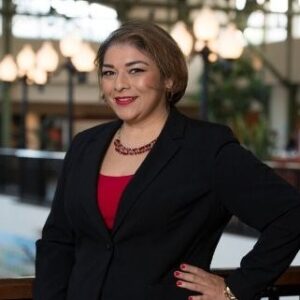REPRESENTATION MATTERS | Mayor Pro Tem Karina Quintanilla

This is part of The Humanist’s monthly series highlighting openly nonreligious elected officials across the nation. Because of the work of the Center for Freethought Equality, the political and advocacy arm of the American Humanist Association, there are now over 100 elected officials at the local, state, and federal level who identify with the atheist and humanist community serving in thirty-three states across the country. Join the Center for Freethought Equality to help politically empower the atheist and humanist community—membership is FREE!
The Center for Freethought Equality’s advances have been groundbreaking. Prior to the 2016 election, there were only five state legislators and no members of Congress who publicly identified with our community; because of its efforts, today we have seventy-one state legislators and a member of Congress, Jared Huffman (CA-2), who publicly identify with our community! It is critical that our community connect and engage with the elected officials who represent our community and our values—you can see a list of these elected officials here.
Mayor Pro Tem Karina Quintanilla
Serving Palm Desert, California
“Grounding my views in science means I will always advocate for policies that make a positive impact on the health of our residents, visitors and labor force.”
Raised in the Coachella Valley, Mayor Pro Tem Karina Quintanilla has lived in Palm Desert since 2002. She received her Bachelor’s degree in Spanish from the University of California, Riverside. Her passion for translating came from being her family’s translator since the age of five. She has translated two books into Spanish, including Anybody Can Enjoy Computers by local author and publisher Vicki Mills, which helped to bring computer literacy to Spanish speaking adults.
Currently in pursuit of a Master’s in Public Administration, Quintanilla has leveraged her background in education to advocate for policy solutions that increase access to educational and career opportunities for her community. While at CSU San Bernardino, Palm Desert Campus (CSUSB-PDC), she developed a tutoring program to reduce the time required to transfer from College of the Desert to CSUSB-PDC and was awarded $240,000 from the Cal-Wellness Foundation to fund professional tutors at two local high schools.
Through her leadership in Hispanas Organized for Political Equality (HOPE), Quintanilla lobbied State Senators in Sacramento to pass Senate Bill 4, Health For All, to expand access to healthcare for Californians, as well as Senate Bill 15, which redirected unused funds for Cal-Grant Scholarships.
Quintanilla has been deeply involved in her local community, particularly in the areas of education and health. In 2005, she was hired as Career Guidance Specialist at her alma mater, Cathedral City High School, where she was Co-Coordinator of the Scholarship Program.
In 2013 she returned as a long-term substitute Earth Science teacher. She was also a four-year member of the Band Booster for the Cathedral City High School Royal Regiment, serving as a board member, chaperone and live translator during meetings. A proud organ donor, blood donor, and registered bone marrow donor, she has donated over seventeen gallons in the Coachella Valley in whole blood, platelets, and plasma.
Quintanilla currently serves on the board of the Center for Freethought Equality, the advocacy and political arm of the American Humanist Association.
Sarah Levin: What motivated you to run for office?
Karina Quintanilla: I was motivated to run for office seeing that the demographics in my city have been changing, but the demographics of the elected officials in my city have not.
Levin: What are your policy priorities and how does your nonreligious worldview impact your policy platform?
Quintanilla: My priorities are centered around public health and education. Grounding my views in science means I will always advocate for policies that make a positive impact on the health of our residents, visitors, and labor force. Providing opportunities for individuals to have options for higher education and technical programs means that there will be more to life than what someone feels their religious ideology will provide for them.
I have been in positions to meet with people running programs in leased space from religious organizations, as long as they are not using public funds to indoctrinate clients. One example was allowing an organization to operate within leased space at a church and greatly expand the number of childcare spaces available. Another time, I was part of a discussion and voted against an organization offering “birth choice counseling” for young mothers. Unfortunately, they have a reputation of counseling via religious guilt to keep a child. While others voted for it, another board member and I were in agreement that the term “counseling” was too broad and more oversight was needed given the services they claimed they were offering. This instance felt more open to indoctrination than the other.
Levin: Why was it important for you to be open about your nonreligious identity?
Quintanilla: I strive to be respectful of the beliefs of others as I hope they will respect my choice to live without religion. I am able to be open and honest with residents, especially when engaging with youth, given the growing demographic of “nones” in our country.
Levin: How did voters respond (if at all) to your openness about your nonreligious identity?
Quintanilla: Most of the discussions regarding my presence on council revolves around bringing a different perspective informed by my cultural and economic background.
To learn more about Mayor Pro Tem Karina Quintanilla , visit:
